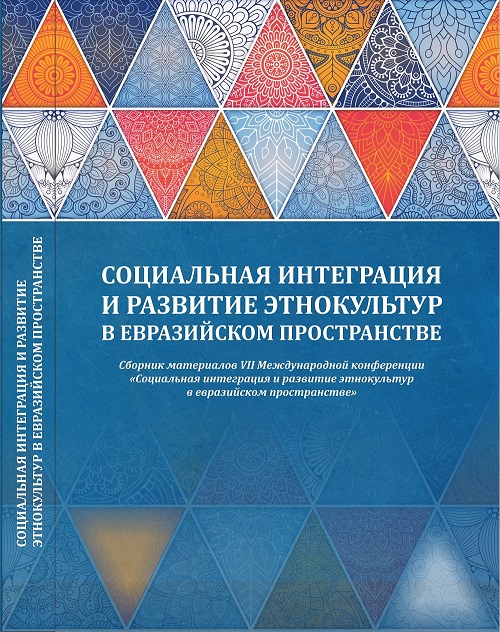CULTURE OF TRUST AS A RESOURCE FOR SOCIAL INTERGATION IN BORDER REGIONS OF RUSSIA
Main Article Content
Abstract
Trust fulfils important functions in society, smoothing cultural differences and social contradictions, contributing to greater cohesion and solidarity, integration of citizens on the basis of shared interests. It is a twofold process, supposing interdependence of the truster and the trustee. Existing in society social norms, values, rules of behavior and representations characterize the culture of trust and as significant resource for social development. Empirical materials of sociological survey conducted in one border region of Russian – the Altai territory (n = 620, respondents’ age from 18 to 75 years), authors examine components of the culture of trust, represented by indicators of generalized and institutional trust, trust towards social environment, particularized forms of trust and interrelations almond them. The main conclusion is the acknowledgment of the «crisis of trust» at the societal level, its tough social-economic determination. The trust becomes a luxury, accessible only for several categories of citizens, or forced response to sharp poverty and social vulnerability, while particularized practices based on group favoritism, compensating the lack of trust, are proliferating. Hence, the resource of trust and its potential can’t be used without creation of institutional conditions, adequate for social realities, which encourage the decrease of social anxiety and optimization of social moods.
Downloads
Article Details

This work is licensed under a Creative Commons Attribution-NonCommercial-NoDerivatives 4.0 International License.
References
2. Гудков Л. Д. «Доверие» в России: смысл, функции, структура //Вестник общественного мнения. Данные. Анализ. Дискуссии. 2012. №. 2 (112).
3. Гужавина Т. А. Доверие и его роль в модернизационном развитии региона // Экономические и социальные перемены: факты, тенденции, прогноз. – 2014. – №. 5 (35).
4. Данкин Д. М. Культура доверия как важнейший ресурс безопасности // Безопасность Евразии. 2005. № 4. С. 491–505.
5. Заболотная Г. М. (2003). Феномен доверия и его социальные функции. Вестник Российского университета дружбы народов. Серия: Социология. 2003. 4(5). С. 79–85.
6. Лапин Н.И. Пути России: социокультурные трансформации. М., 2000.
7. Лапкин В., Пантин В. Ценностное размежевание и социально-политическая дифференциация в России // МЭиМО. 2000. № 4. С. 54–63.
8. Мерсиянова И. В. Доверие и недоверие в гражданском обществе // Ученые записки ИМЭИ. 2012. Т. 2. №. 1. С. 24–33.
9. Молодов О.Б. (2013). Доверие как фактор консолидации общества. Вопросы территориального развития, (5 (5)), 4.
10. Мукомель В., Рыжова С.В. Доверие и недоверие в межнациональных отношениях // Социологические исследования. 2017. №1. С. 37–46.
11. Омельченко Д. А., Максимова С. Г., Воронина Е. В. Институциональное доверие как фактор национального единства и сплоченности населения России // Социальная интеграция и развитие этнокультур в евразийском пространстве. 2016. № 4-1. С. 155–162.
12. Хоскинг Д. Доверие и недоверие в СССР: общий обзор // Неприкосновенный запас. 2013. № 6.
13. Штомпка П. Доверие - основа общества. Москва, 2012.
14. Fukuyama F. Trust: The social virtues and the creation of prosperity. New York: Free press, 1995.
15. Hopkins B. Cultural differences and improving performance: How values and beliefs influence organizational performance. Routledge, 2016.
16. Lewis D. Whistleblowing in a changing legal climate: is it time to revisit our approach to trust and loyalty at the workplace? // Business Ethics: A European Review. 2011. Vol. 20. №. 1. P. 71–87.
17. Lewis J. D., Weigert A. Trust as a social reality // Social forces. 1985. Vol. 63. № 4. P. 967–985.
18. Misztal B. Trust in modern societies: The search for the bases of social order. John Wiley & Sons, 2013.
19. Ortiz E., Roser M. Trust. Cross-country surveys. URL: https://ourworldindata.org/trust (дата обращения: 1.06.2019).
20. Sztompka P. Trust, distrust and the paradox of democracy // Polish Pol. Sci. YB. 2000. Vol. 29.
21. Van Lange P. A. M. Generalized trust: Four lessons from genetics and culture // Current Directions in Psychological Science. 2015. Vol. 24. № 1. С. 71–76.

